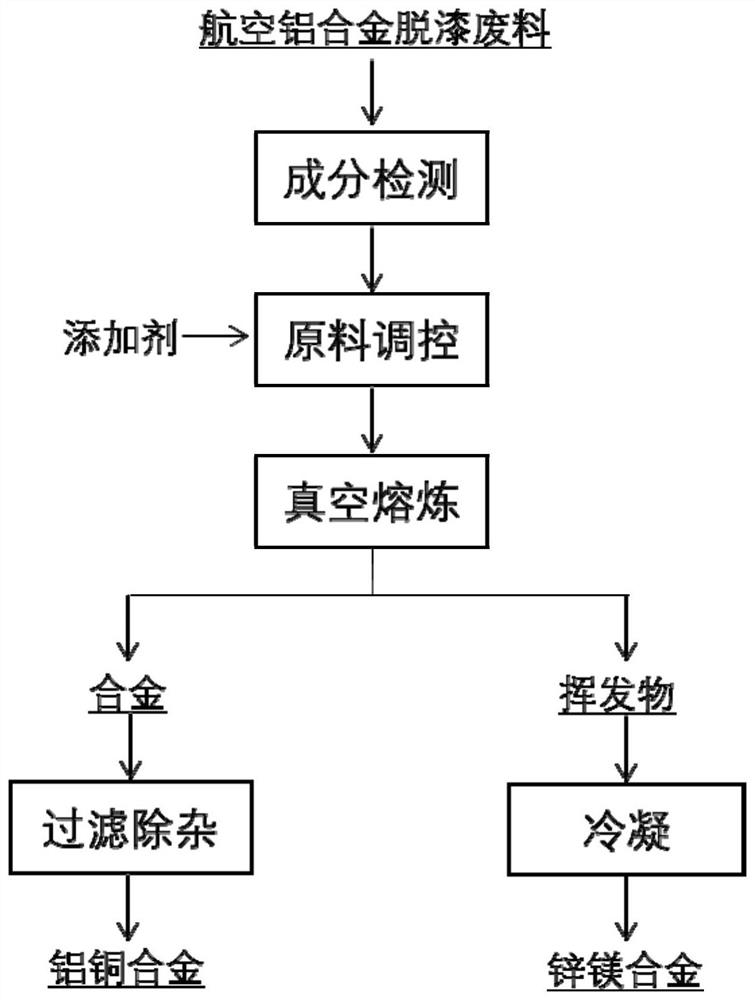A method for preparing copper-containing aluminum alloy from aviation industry aluminum alloy waste regeneration
An aviation industry, copper-aluminum alloy technology, applied in circular economy technology and environmental protection fields, to achieve high use value, save recycling costs, and avoid harm
- Summary
- Abstract
- Description
- Claims
- Application Information
AI Technical Summary
Problems solved by technology
Method used
Image
Examples
Embodiment 1
[0039] Take an appropriate amount of aviation aluminum alloy waste after paint stripping treatment for simple melting. After ICP-OES detection, the main alloy components of the original aluminum alloy are shown in Table 2.
[0040] According to the composition requirements of the target alloy 2024 aluminum alloy, pure copper with a mass fraction of 0.8% was weighed and added to the mixed alloy.
[0041] Put the material into a high-purity graphite crucible, vacuumize the induction furnace until the internal pressure is lower than 30Pa, and heat and melt in an induction furnace with a built-in graphite condensing plate at a temperature of 780°C. Control the frequency of the induction furnace to realize the stirring of the melt. During this process, zinc and magnesium are separated from the aluminum alloy melt in the form of steam, volatilized to the condensation pan placed on the upper part of the melt and condensed.
[0042] After 60 minutes, the aluminum alloy solution was fil...
Embodiment 2
[0047] Take an appropriate amount of aviation aluminum alloy waste after paint stripping treatment for simple melting. After ICP-OES detection, the main alloy components of the original aluminum alloy are shown in Table 3.
[0048] According to the composition requirements of the target alloy 2014 aluminum alloy, a copper-magnesium alloy with a mass fraction of 2.5% was weighed and added to the mixed alloy.
[0049] Put the material into a high-purity graphite crucible, vacuumize the induction furnace until the internal pressure is lower than 25Pa, and heat and melt in an induction furnace with a built-in graphite condensing plate at a temperature of 900°C. Control the frequency of the induction furnace to realize the stirring of the melt. During this process, zinc and magnesium are separated from the aluminum alloy melt in the form of steam, volatilized to the condensation pan placed on the upper part of the melt and condensed.
[0050] After 120 minutes, the aluminum alloy ...
Embodiment 3
[0055] Take an appropriate amount of aviation aluminum alloy waste after paint stripping treatment for simple melting. After ICP-OES detection, the main alloy components of the original aluminum alloy are shown in Table 4.
[0056] According to the composition requirements of the target alloy 2219 aluminum alloy, a copper-chromium alloy with a mass fraction of 3.0% was weighed and added to the mixed alloy.
[0057] Put the material into a high-purity graphite crucible, vacuumize the induction furnace until the internal pressure is lower than 10Pa, and heat and melt in an induction furnace with a built-in graphite condensing plate at a temperature of 1030°C. Control the frequency of the induction furnace to realize the stirring of the melt. During this process, zinc and magnesium are separated from the aluminum alloy melt in the form of steam, volatilized to the condensation pan placed on the upper part of the melt and condensed.
[0058] After 180 minutes, the aluminum alloy ...
PUM
 Login to View More
Login to View More Abstract
Description
Claims
Application Information
 Login to View More
Login to View More - R&D
- Intellectual Property
- Life Sciences
- Materials
- Tech Scout
- Unparalleled Data Quality
- Higher Quality Content
- 60% Fewer Hallucinations
Browse by: Latest US Patents, China's latest patents, Technical Efficacy Thesaurus, Application Domain, Technology Topic, Popular Technical Reports.
© 2025 PatSnap. All rights reserved.Legal|Privacy policy|Modern Slavery Act Transparency Statement|Sitemap|About US| Contact US: help@patsnap.com



